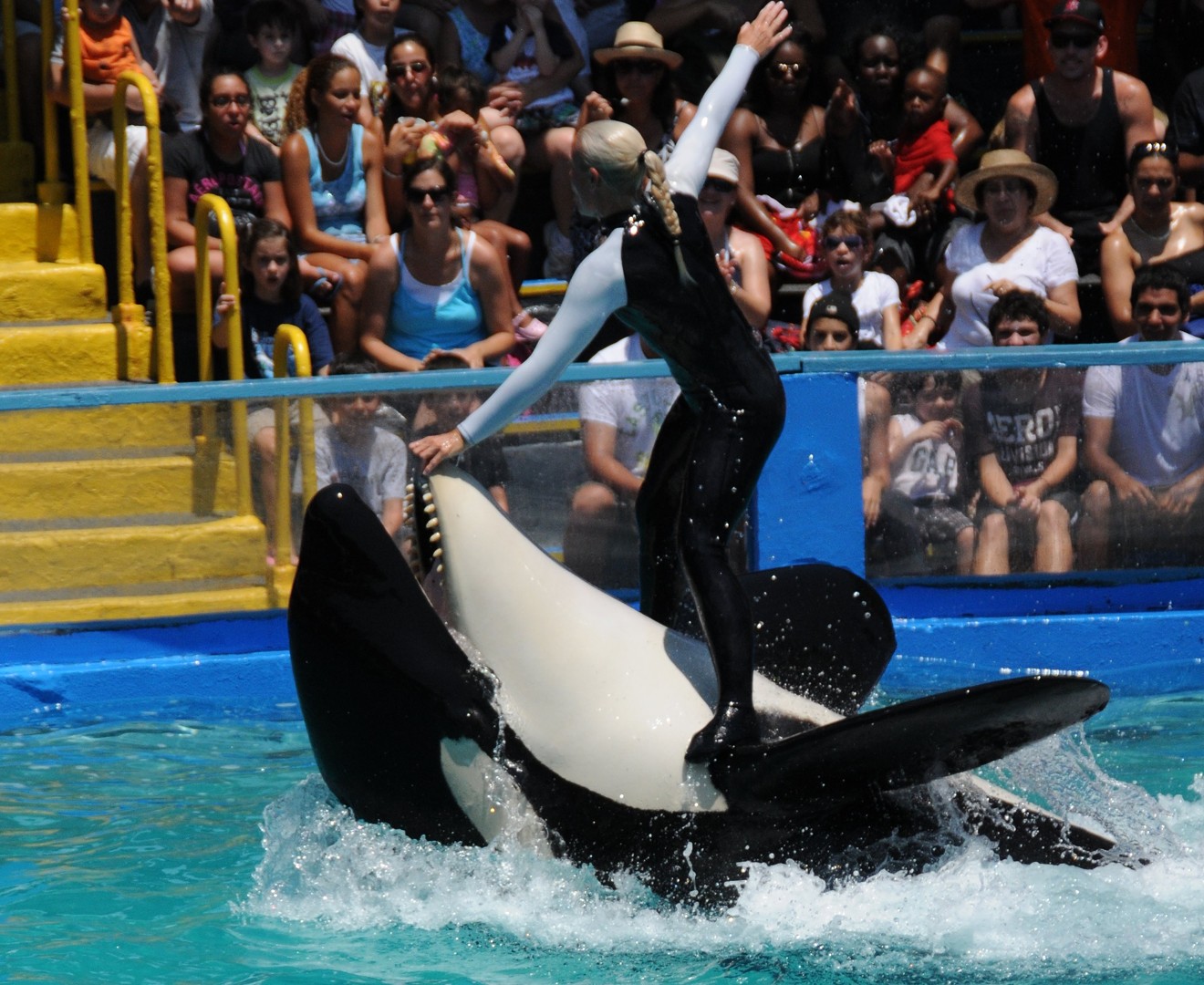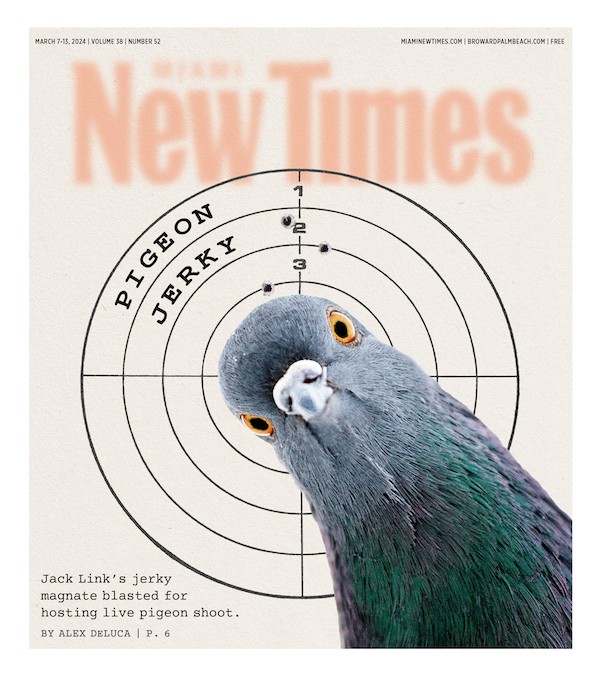The whale, also known as Toki, died on the afternoon of August 18 after her health deteriorated late this week, Miami Seaquarium said in a joint statement with nonprofit Friends of Toki.
"Over the last two days, Toki started exhibiting serious signs of discomfort, which her full Miami Seaquarium and Friends of Toki medical team began treating immediately and aggressively," the statement reads.
Lolita had suffered from a near-fatal infection throughout 2022, though the Seaquarium suggested she was on the mend before its March 2023 announcement of the plan to relocate her to the yet-to-be-built marine sanctuary.
Three days ago, on August 15, Miami Seaquarium said Lolita was "very stable and as good as she can be at 50 years of age."
Captive Life
The famed killer whale had been confined to a roughly 80-by-35-foot concrete tank at Miami Seaquarium since 1970, when she was captured off the coast of Washington state in one of the last drive hunts for orcas held in the Pacific Northwest. Animal rights activists called for her release for decades, citing allegedly poor conditions and cramped space in her pool, which appeared to violate the federal government's minimum size requirements for whale tanks. A June 2021 USDA inspection report found that the facility, owned by Palace Entertainment at the time, was not properly monitoring water quality and maintaining Lolita's tank, and that the whale was not receiving enough shade in the Florida heat. That summer, Miami-Dade County inspectors cited Miami Seaquarium amid reports of structural deterioration in the stadium and paint peeling around the whale's pool.
The USDA ultimately declined to reissue an exhibition permit to the Seaquarium, meaning the park was no longer allowed to display Lolita or use her image for profit.
After jumping and twirling for two generations of spectators, Lolita was retired from public performance in March 2022 while her health was failing. Miami Seaquarium announced a year later that it had joined forces with Friends of Toki and wealthy NFL team owner Jim Irsay to relocate the aging whale to the sanctuary in her native Salish Sea. The marine park said the "historic deal" was made possible thanks to a "generous financial contribution" from Irsay.
"We're gonna try to save Lolita the Whale… but I'm gonna need help and ocean blessings. Lots of red tape and hurdles," Irsay said prior to announcing the project.
Friends of Toki said that while permitting and logistics would be a challenge, it planned to resettle Lolita by mid-2025. The project was estimated to cost around $15 million.
Biding Time
Activist Phil Demers called for Lolita to be removed on an emergency basis rather than waiting for the sanctuary to be built over an extended period. He said the whale, believed to be 57 years old, needed to be immediately transported out of Miami and into a larger, better equipped facility in light of her chronic illness."We can't continue to wait for a whale utopia to be built and wait for optimal conditions for her to enter this utopia... The longer we wait for perfection, the likelier it becomes that she is going to die," Demers told New Times in March.
At the time, Demers and other animal rights advocates, including former Seaquarium veterinarian Jenna Wallace, questioned whether the water in Lolita's tank, which had become visibly green with algal growth following her removal from public performance, was sufficiently filtered to protect her health.
In an August 18 interview following Lolita's death, Demers tells New Times Lolita's situation mirrored that of Kiska, another killer whale, who passed away at Marineland in Canada while a project to transport her to a marine sanctuary was pending. Demers, a former animal trainer, worked at Marineland for more than a decade."We can't continue to wait for a whale utopia to be built."
tweet this
Kiska died less than three weeks before the Seaquarium press conference announcing the project to release Lolita.
"When I saw Lolita's conditions, I knew the countdown was on," Demers tells New Times. "Unfortunately a lot of people in media especially bought into this notion of a big, grandiose plan for her. But none of it made sense to me."
As criticism mounted of Lolita's living conditions and her 2022 illness, Miami Seaquarium maintained that it was improving her water quality and monitoring her closely. The facility previously told New Times that there was "significant improvement to the water quality" since new owner Eduardo Albor's company Dolphin Co. bought Miami Seaquarium in 2021. The company owns more than 30 marine-themed amusement parks and dolphin enclosures worldwide.
In December 2022, a veterinarian working with Friends of Toki maintained that water quality in the tank was improving after the park changed out filter media and sought to improve the water recirculation system, which he said was outdated.

Photo by Andy Blackledge/Flickr
"Today We Say Goobye"
On the heels of Lolita's death, Miami-Dade County Mayor Daniella Levine Cava released a statement in mourning."Alongside the many Miamians who grew up visiting her, the generation of activists around the world that were inspired by her story, and the caretakers who remained dedicated to her health until the very end, today we say goodbye to our beloved Toki," the mayor said.
People for the Ethical Treatment of Animals (PETA) called Lolita's living space "the bleakest orca tank in the world."
"Kind people begged the Miami Seaquarium to end Lolita’s hellish life in a concrete cell and release her to a seaside sanctuary, where she could dive deep, feel the ocean’s currents, and even be reunited with the orca believed to be her mother, but plans to make this move came too late, and Lolita was denied even a minute of freedom from her grinding 53 years in captivity," PETA said.
While Lolita was in old age, some female orcas in the wild are believed to live past 80 years old. Life expectancy for wild orcas is estimated to be around 50.
In a July health assessment, Friends of Toki said the whale's condition "remained relatively stable" but that she was experiencing abdominal health issues and fighting infection. The group said the whale was being fed the "highest quality salmon, herring, and capelin available on the market," and trainers were prepping her for her prospective cross-country trip. According to the assessment, she was receiving antibiotic and antifungal treatment.
In its August 15 report, Miami Seaquarium said "great milestones have been achieved" since the relocation project's announcement. Pledging future updates on the whale's condition, the facility said Lolita was eating well and undergoing training with a stretcher for her trip.
"Thanks for sharing the dream," the message stated.











